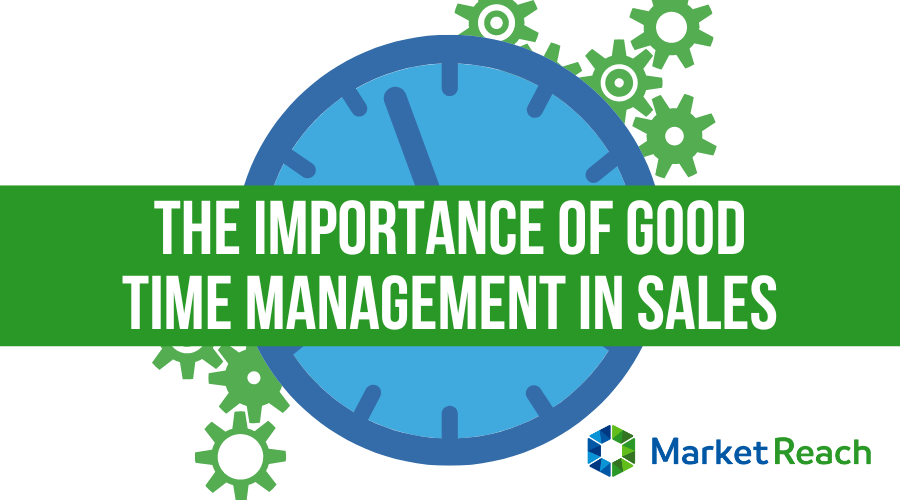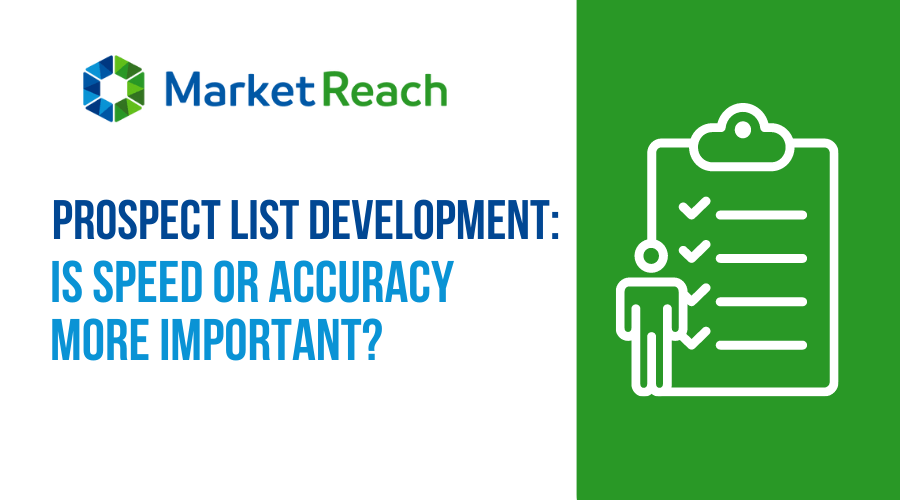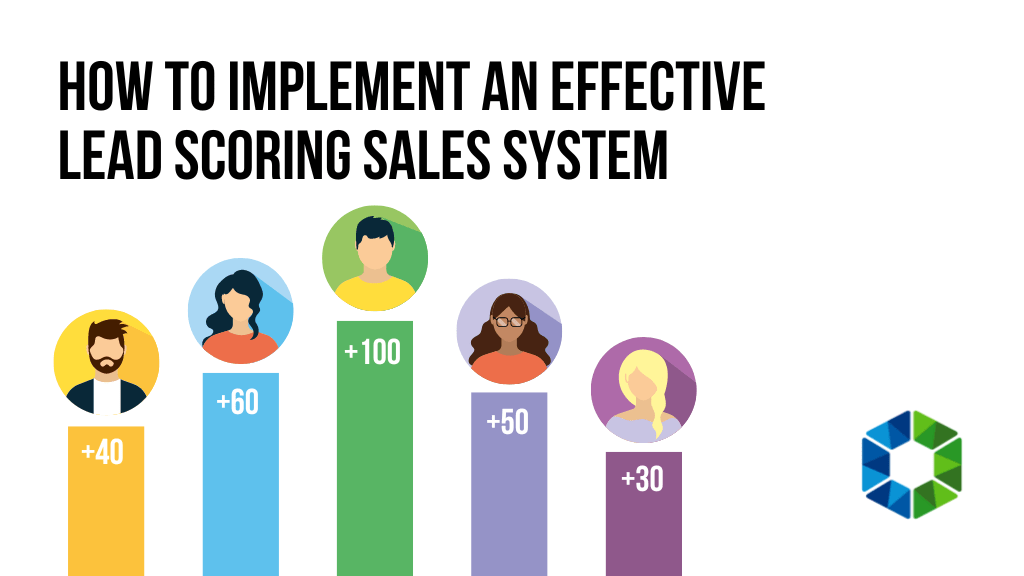Back in the beginning of the summer last year, we provided tips to keep your sales pipeline flowing through the summer months. Now let’s keep the momentum going as the decision makers return from their summer vacations, eager to finish out the last quarter strong after a very difficult time to own a business or make a living in sales. (more…)
Currently browsing: MarketReach Blog
Latest Updates, Trends and Topics

The Importance of Good Time Management in Sales
Time management is an important skill that all salespeople should learn how to master and key performance indicators are a great way to measure how well your salespeople manage their time. The most important KPI that you might use to measure performance is the number of sales each salesperson makes in a week or month. While this can certainly be helpful in determining how “good” your salespeople are at selling, it is also important to consider the quality of each of these sales along with the interactions that come before it. Sometimes it is better to make fewer substantial sales than many small ones that are underqualified or require. With the help of good time management skills, your salespeople can…
(more…)
The Psychological Side to Selling
At first thought, you may be thinking “how does psychology have anything to do with sales?” But after thinking about it for a while, you may realize that the answer is… a lot. Selling is all about getting into the mind of your prospect and persuading them (or better yet – letting them come to the conclusion themselves) that they need what you offer. Learning about how people think is a great way to better understand your prospect and it will become helpful to arm yourself with the tools to understand and sway your prospect’s thinking. Here are some tips on how you can use psychology to sell during your next sales call: (more…)

Communication: The Foundation of Sales
Communication and Sales, especially B2B sales, go hand in hand. Very few decisions in the business-to-business landscape are made without some kind of human engagement. Effective communication between salespeople and buyers is crucial. In the process of communicating with prospects, talented salespeople focus their prospecting efforts on properly qualifying, utilizing Effective probing questions, and setting up sales opportunities that have a true “reason to meet”. Let’s dive into more technical concepts about communication.
The verbal communication process is built on four main components: encoding, medium of transmission, decoding and feedback. Encoding is the translation of thoughts. From a salesperson’s point of view, it is taking a larger, more abstract picture and breaking it down into simple terms for the buyer to easily understand. In order to enhance the encoding stage, the salesperson should focus on two things: their choice of words and tone. Using short words and phrases can keep the salesperson from rambling and losing the prospect’s interest. Having specific answers to the prospect’s questions will provide a level of transparency, ultimately leading to a more trusting prospect. The salesperson’s tone of voice should match the level of the prospect’s energy level. If the prospect seems quieter, having a loud and aggressive approach may just turn off the prospect for the rest of the conversation. (more…)

Prospect List Development: Is Speed or Accuracy More Important?
When it comes to developing and qualifying prospect lists, the ultimate goal is to identify high quality targets who have the potential to convert into customers. Both speed and accuracy are important during this process, but should one be prioritized over the other?
Even though it sounds ideal to have an extensive list of prospects, you also want to make sure that you are reaching the right people – that you have accurate names of decision makers and their titles, validated emails, phone numbers, addresses and company descriptions. Obtaining these items is most certainly time-consuming. So how do we justify our time commitment in cleaning up our prospect records (i.e. maintaining a clean CRM)? Consider the following advantages and disadvantages of both speed and accuracy during the prospect list development process and check out our conclusion on which is more important: (more…)

How to Implement an Effective Lead Scoring Sales System
What is Lead Scoring
Lead scoring is a methodology that is shared between both Marketing and Sales that determines a lead’s sales-readiness. The process ultimately creates a list of leads that are compared and ranked based on which are most ready to purchase, also known as the “hottest leads”. The rank is assessed by the Marketing team and, when appropriate, turned over to the Sales team to engage the lead. Walk away from this article with at least this one action item: Rate each prospect A, B, or C for better segmenting in the way they are given attention.
The basics of lead scoring compares explicit and implicit information, as well as active and latent behavior. Explicit data refers to the information about the physical company you are prospecting, and can be broken down into two categories: firmographic and demographic. Firmographic information consists of the company’s location, the industry they are in, the number of employees they have, and other things about the company. Demographic information measures how the prospect fits your targeted audience by investigating specific job title or role, purchasing power, and the years of experience. On the other hand, and according to Nurture, implicit information analyzes the behavior of your prospects. This can be extracted through their actions, so if your prospect has registered for a webinar or your newsletter, it shows they may be interested. If your prospect has unsubscribed from your email, however, that would show they are not interested. (more…)

20 Things We’ve Learned in Sales Prospecting Over 20 Years
It’s hard to sum up 20 years of industry experience in one article, but we are going to try. We are so excited to celebrate 20 years of providing B2B Appointment Setting & Lead Generation services, as well as Integrated Marketing solutions! Over the years, we’ve gained extensive sales knowledge that helps us provide continued value to our clients. After brainstorming as a team, here’s a summary of what we learned, particularly as it relates to the prospecting bucket of the sales process:
1. Maintain a Clean CRM.
Without a well-designed and well-utilized CRM, there is no way to organize a productive day. If you don’t know who your prospects are, how do you expect to nurture them and build brand recognition with them? If you don’t have a CRM, work on getting one, and use Excel for the time being.
2. Take Great Notes on All Prospect Conversations.
You may have a great memory, but why would you crowd your brain up with information from hundreds of conversations or rely on it, for that matter? Reflect on the interaction and enter all relevant information they relayed to you. Before your next call or email, revisit your notes to be precise and show you were listening.
3. Quality Prospect Lists Yield Better Results.
While purchasing a third-party list might be appealing cost-wise and a time-saver, the data will be outdated and require hours of thorough qualification work to update. Be prepared to Invest in a quality list – the growth of your business relies on it. Whether your team organically builds it in-house, purchase a list or have it vetted by a skilled call team like MarketReach, better data yields better results. (more…)

How to Keep Prospects Engaged on a Sales Call
Let’s face it, keeping the attention of a prospect is hard. You will often encounter people who don’t have the time to talk, aren’t interested in listening to a pitch, or who will hang up immediately without giving the time to prove the value of your call. In a previous blog post, we provided some tips on how to gain a prospect’s attention during an introductory call. These tips included taking their guard down, using vocal variety, and asking smart questions. But, gaining a prospect’s attention is only the first step, getting them to stay on the phone and engage is the next step. Consider these tips to keep a prospect on the phone once you’ve gained their attention: (more…)

Prospect Qualification and Appointment Setting to Land More Meetings
This article was published on December 21st, 2020 in Insurance Journal.
The objective of prospecting is to find quality opportunities to narrow the sales funnel, and then consistently target that focused group with marketing messages to get noticed. For insurance brokers, you have the luxury of finding third party list sources that start you off knowing key data about your prospect universe. Instead of chasing non-qualified prospects — or worse, not even knowing who your prospect universe even is — prospecting followed by properly executed appointment setting leaves no rock unturned.
Every prospect on your list is a new opportunity to qualify, disqualify, set a callback or land a sales meeting for a producer. Phone outreach is the best way to land more sales appointments and the only way to determine if, in fact, the opportunities in your local universe or target industry are sellable. Phone outreach is also one of the only ways to incite two-way communication between a buyer and a seller, which will then lead to more closed deals.
What Is Strategic Prospecting Through Appointment Setting?
Appointment setting, also known as telemarketing, is based on strategically conducting calls in order to schedule introductory sales meetings with decision-makers. For best results, the prospects are pre-qualified through a qualification process, based on specific parameters set by your agency. Typically, to get in the door with workers’ compensation or property/casualty insurance, the qualifier is either total premium, or at least, staff size. Chasing opportunities that equate to less than $1,500 in annual commission is not good use of time or marketing dollars. Instead, reserve those opportunities to close for inbound only… Read more

The Benefits of Crafting a Well-Written Prospecting Script
The most daunting part of making a sales call is preparing for the unknown. Will I reach decision-makers? What kind of questions will the decision–maker ask? Am I prepared with the best responses? Enter the sales script! Think a script is only useful for newbie salespeople? Think again! With the new year comes an opportunity to dust off old material and think of our messaging in a new way. Taking the time to craft a script that is timely and relevant can mean the difference between a closed deal (great intro, effective probing questions and a convincingly delivered Value Proposition) and a lost opportunity (due to a poor introduction and lack of engagement questions that lead to a summary dismissal). Consider these benefits of taking the time to craft a new prospecting script: (more…)
